10 Oct 2014 | Azerbaijan, Azerbaijan News, News and features
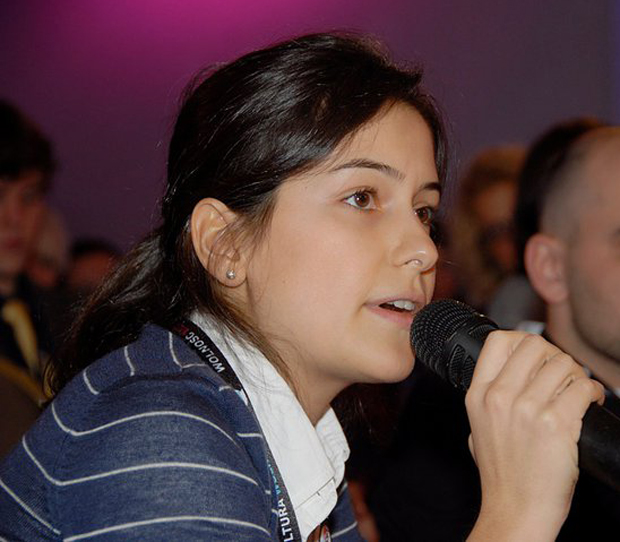
Arzu Geybulla
Journalist Arzu Geybulla has received a growing number of threats on social media following an interview with Azerbaijani news site modern.az.
Geybulla has been subject to ongoing intimidation because of her work at Istanbul-based Armenian paper, Agos. The interview has led to Geybulla being accused of treason by the Azerbaijani media.
Despite calls from the European Parliament in September, Azerbaijan has still failed to release prominent political prisoners Leyla and Arif Yunus, Rasul Jafarov, Intigam Aliyev and Hasan Huseynli.
Jodie Ginsberg, CEO of Index on Censorship, said: “Azerbaijan portrays itself internationally as a country that values human rights and respects the freedom of its citizens to express themselves. In reality, anyone who seeks to speak or act freely in Azerbaijan is targeted, imprisoned and harassed. The international community needs to take a far tougher stance on Azerbaijan to help defend individuals like Arzu and the defenceless individuals to which her work gives voice.”
Geybulla wrote for Index on Censorship about her thoughts on free expression in Azerbaijan on July 30, the day Leyla Yunus was detained.
Leyla and her husband have now been imprisoned for 73 days. Javarov has been in prison for 70 days since August 2, and Aliyev has been detained for 64 days, since August 8. Huseynli, who has been detained for 195 days since March 30, is serving a six year sentence.
Take action to support Arzu Geybulla, Leyla and Arif Yunus, Rasul Jafarov, Intigam Aliyev and Hasan Huseynli.
Post on Twitter, Facebook, Reddit or share with your friends. Let @PresidentAZ know you ware watching.
Please send appeals immediately:
— Condemning the campaign of intimidation directed at Arzu Geybullayeva for her legitimate work as a journalist at Agos;
— Calling on the Turkish and Azerbaijani authorities to investigate any threats of violence against her and to ensure her safety;
— Reminding them that they have the obligation to safeguard Geybullayeva’s right to freedom of expression under the European Convention on Human Rights (ECHR) and the International Covenant on Civil and Political Rights (ICCPR), to which they are both state parties.
Appeals to:
Mr Ramil Usubov
Minister of Internal Affairs for the Republic of Azerbaijan
7 Husu Haliyev Street
Baku, Azerbaijan
AZ1001
Email: [email protected]
Twitter: @PresidentAZ
Mr Efkan Ala
Minister of Interior for the Republic of Turkey
T.C. İçişleri Bakanlığı
Bakanlıklar
Ankara, Turkey
Email: [email protected]; [email protected]
Twitter: @efkanala
If possible, please copy appeals to the diplomatic representative for Azerbaijan and Turkey in your country. Let us know of any actions you have taken and responses you receive.
This article was posted on 10 October 2014 at indexoncensorship.org
10 Oct 2014 | Draw the Line, Youth Board
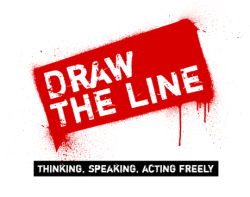
As protests continue to rock many countries, at times leading to use of excessive force including tear gas and rubber bullets by law enforcement officers against protesters, people have openly raised questions on police abuse. This month’s Draw the Line question focused on the excessive use of force during protests and the role police can play in striking the balance between keeping the peace and protecting free speech.
Being a witness to recent protests that turned ugly after use of batons, tear gas and rubber bullets against civilians protesting rigged elections in Pakistan, it was interesting to compare various responses on the #IndexDrawtheLine Twitter feed offered by participants from different parts of the world. An article shared by Fiona Bradley during the debate on Twitter discussed attempts made by Chinese authorities to censor use of police force against pro-democracy protesters in Hong Kong. The use of tear gas and counter protesters to disperse demonstrators has also changed the popular opinion regarding the city’s police that was once considered to be the best in region. On the other hand, an Amnesty International report revealed cases of excessive use of force by Brazil’s police throughout the protests that erupted before and during the Fifa World Cup this summer. This clearly depicts the extent to which police can be used by local authorites against civilians’ voicing their opinion publicly.
In an interview for the PBS Newshour, Margaret Huang, deputy executive director of campaigns and programs at Amnesty International’s US arm, raised an important point about the tactics deployed by the police in Ferguson, Missouri, during protests during there. “The police’s reaction might have been an overreaction. It may have actually been a violation of international standards for appropriate police response. If your purpose is to disperse people, tear gas is not a great tool for that,” Huang said. “It’s worth noting that tear gas is actually a weapon that’s not allowed to be used in warfare”, she said, “because it can be indiscriminate in who it targets. So the fact that police agencies in [the US] use it for crowd dispersal raises huge concerns about whether that’s a useful or appropriate response.”
Another important concern that has been raised is the increasing militarisation of police that is counter productive and looks more like an intimidating combat against foreign enemies in a war zone. In this case, should protesters have their own force to protect them in case the police start firing rubber bullets and tear gas on non-violent protesters or should there be appropriate training on dealing with such scenarios, keeping in mind the wide difference in domestic and military operations?
It is generally accepted that the state has an obligation to prevent injury and loss of life during public gatherings while maintaining public order to prevent social disruption and damage to property, according to the United Nations. Disgraceful police excesses will continue unabated during public gatherings unless authorities bring police tactics in line with basic human rights standards whether they belong to US, China or developing countries in south Asia and the Middle East.
A few participants from Pakistan offered the point that their country’s police cannot be trained on the lines of “protect and guard” instead of “us versus them” unless officials are appointed on merit without any political interference. But in the case of countries where political interference during recruitment isn’t the problem, one can not help but wonder about the steps required to make the police fall in line with defined international standards.
In the wake of G20 protests in London during the year 2009 that resulted in the death of news vendor Ian Thomilson, the Metropolitan Police came up with a 60 page report Adapt to Protest which advocated the need of major reforms required to deal with policing of protests. The report made a number of immediate recommendations that stressed facilitating peaceful protests, improving communication with the public/ protest groups through dialogue and moderating the impact of containment for proper access of food, water and other essentials. It acknowledged the dire need of giving importance to human rights during operational decisions and training that is needed to equip officers with tactics for effective policing and facilitating of protest activity. Such steps need to be introduced by law enforcement and then implemented independently which is not possible without the cooperation of political authorities and the public.
In this age of instant communication, people are bound to question images and videos of police abuse during mass protests accessible through internet and live television. The only way for police to strike the balance in maintaining peace and protecting civilians’ right to free speech and assembly is to start approaching it as a healthy expression of democracy instead of a menace that needs to be stifled and discouraged.
This article was published on 10 October 2014 at indexoncensorship.org
10 Oct 2014 | Events, Press Releases
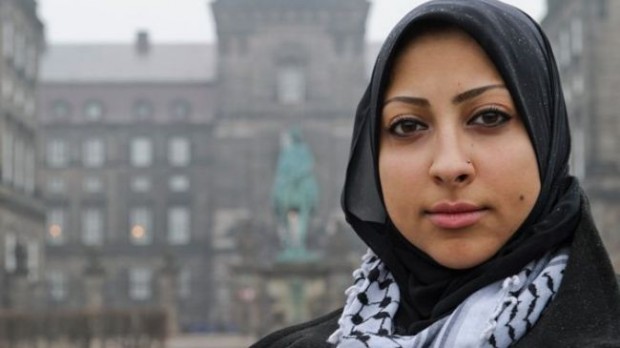
Bahrain human rights defender and 2012 Index Award Winner Nabeel Rajab is being detained and facing trial under arrest for peacefully expressing his views on Twitter.
Please join Index on Censorship and the Bahrain Institute for Rights and Democracy (BIRD) for a press conference with Bahraini activist and Co-Director of Gulf Centre for Human Rights Maryam Alkhawaja, who was released from prison three weeks ago, to discuss Nabeel Rajab’s detention and the recent developments in Bahrain.
WHEN: Wednesday October 15 at 11.00am
WHERE: Index on Censorship office: 92-94 Tooley Street, SE1 2TH, London.
For more information and to RSVP, please email [email protected] or call 0207 260 2660
Background for editors
Bahraini human rights defender Nabeel Rajab, President of the Bahrain Center for Human Rights and Director of the Gulf Center for Human Rights, is being charged for “insulting a public institution” over a tweet.
The arrest came less than 24 hours after Rajab returned to Bahrain from an advocacy trip where he spent over two months traveling throughout Europe to advocate for human rights in Bahrain. He also attended the UN 27th Human Rights Council Sessions to advocate for human rights in Bahrain and campaign for greater support to the Bahraini people’s struggle for rights and democracy.
Rajab was imprisoned in Bahrain for two years between July 2012 and May 2014 for exercising his right to freedom of assembly by participating in and calling for peaceful protests, in the capital city Manama, in defence of people’s rights. Before that he was prosecuted on multiple occasions for his tweets. Rajab has over 239,000 followers on twitter (@NabeelRajab) and his voice online is one of the most prominent in Bahrain, and across the Middle East. Following his release, Rajab continued to receive threats of repeated arrested, but was determined to continue with his peaceful human rights work.
Human rights activist Maryam Alkhawaja was released from prison in Bahrain in September but the charges against her still stand. Alkhawaja was arrested when she travelled to Bahrain to visit her father, prominent human rights defender and co-founder of the Bahrain Centre for Human Rights (BCHR), Abdulhadi Alkhawaja.
This will be her first UK press conference since her release.
10 Oct 2014 | News and features
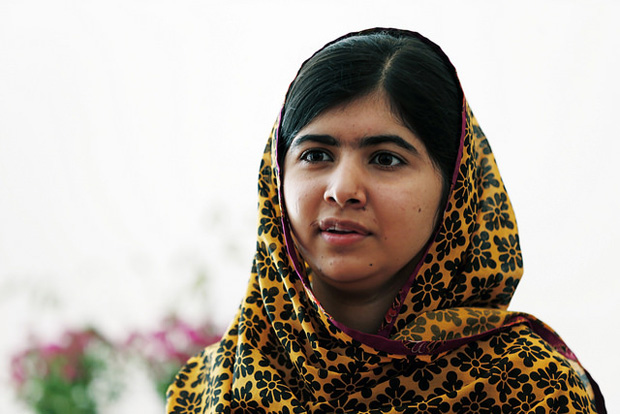
Malala Yousafzai Photo: (©Torbjørn Kjosvold/FMS/CreativeCommons/Flickr)
Pakistani education campaigner Malala Yousafzai has been awarded the 2014 Nobel Peace Prize. Yousafzai shares the award with Kailash Satyarthi, an Indian children’s rights activist.
Yousafzai was awarded the Doughty Street Chambers Advocacy award based on her work at the 2013 Index on Censorship Freedom of Expression Awards.
In October 2012, a Taliban gunman shot education campaigner Malala Yousafzai in the head and chest for her activism, as she was returning home from school in Pakistan’s Swat district. After months of treatment, she returned to school in Birmingham later that year.
The schoolgirl’s father, Ziauddin Yousafzai, accepted the award on his daughter’s behalf saying:‘I want to give a message to the world. I didn’t do anything special. As a father, I did one thing, I gave her the right of freedom of expression. All fathers and mothers, give your daughters and sons freedom of expression. Freedom of expression is a most important right. The solution of any conflict is to say the right thing, to speak the truth.’
At 17, Yousafzai is the youngest ever winner of the Nobel Prize. Fellow recipient, Kailash Satyarthi has lead various peaceful protests and demonstrations, focusing on the exploitation of children for financial gain. He formed the Bachpan Bachao Andolan, translated as, Save the Childhood Movement, which combats child labour.
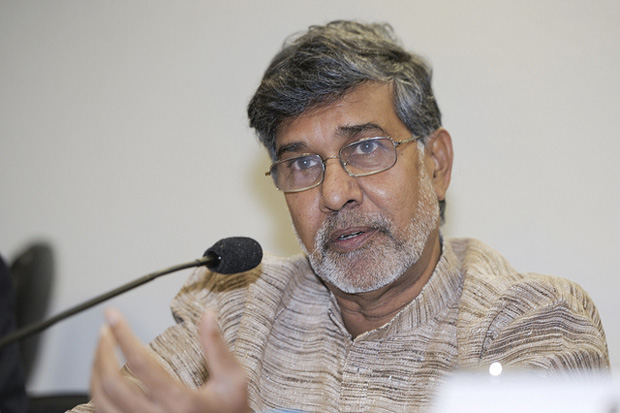
Kailash Satyarthi (Photo: ©José Cruz/Agência Senado/CreativeCommons/Flickr)
This article was posted on 10 Oct 2014 at indexoncensorship.org.





